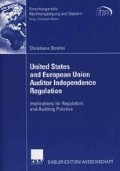Abstract
The need for financial regulation is often justified by the potential for market failure that can result when managers’ posses inside information while investors do not, called “information asymmetry,” as well as from inappropriate behavior of auditors, called “moral hazard.”13 New laws that attempt to address these issues in the United States (Sarbanes-Oxley Act 2002) and in the European Union (Proposal for a 8th Directive of the European Commission 2004a) indicate that the predominant view among legislators is that we need more regulation, more severe penalties, and larger enforcement budgets to protect financial markets from fraud.
Access this chapter
Tax calculation will be finalised at checkout
Purchases are for personal use only
Preview
Unable to display preview. Download preview PDF.
Rights and permissions
Copyright information
© 2006 Deutscher Universitäts-Verlag | GWV Fachverlage GmbH, Wiesbaden
About this chapter
Cite this chapter
(2006). Auditor Independence Regulation. In: United States and European Union Auditor Independence Regulation. DUV. https://doi.org/10.1007/978-3-8350-9115-3_4
Download citation
DOI: https://doi.org/10.1007/978-3-8350-9115-3_4
Publisher Name: DUV
Print ISBN: 978-3-8350-0287-6
Online ISBN: 978-3-8350-9115-3
eBook Packages: Business and EconomicsBusiness and Management (R0)

